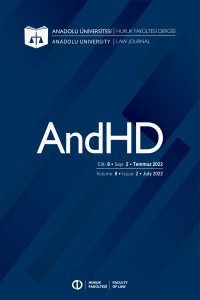Probleme Dayalı Öğrenme Sisteminin Hukuk Fakültesinde Uygulanması: Hukuk Felsefesi ve Hukuk Sosyolojisi Dersleri Örneği
Bu çalışmanın amacı Probleme Dayalı Öğrenme Sistemini ve Türkiye’de sosyal bilimler alanında uygulanmasını Hukuk Fakültesi örnekleminde değerlendirmektir. Hukuk Fakültelerinde genel olarak klasik öğretim metodolojisi kullanılmaktadır. Küreselleşme sürecine bağlı olarak hem hukuki vakalardaki çeşitlilik, hem de hukuksal kaynaklara başvuru açısından hukuki uygulama alanlarının giderek daha spesifik ve çeşitli hale gelmesi sebebiyle klasik eğitim metodolojisi artık hukuk mesleğinin ihtiyaçlarını karşılayamamaktadır. Bu nedenle çalışmamızda PDÖ, klasik öğretim metoduyla kıyaslanarak, bu metodun günümüz hukuk mesleğinin ihtiyaçlarını karşılayan, öğrencilerin pratik yaparak öğrenme sürecini geliştiren bilişsel yaklaşıma uygun bir öğretim metodu olduğu vurgulanacaktır.
Anahtar Kelimeler:
Probleme Dayalı Öğrenme Sistemi, Hukuk Eğitimi, Hukuk Fakültesi, Hukuk Sosyolojisi, Hukuk Felsefesi
Application of Problem Based Learning Systems in Law Schools: Philosophy of Law and Sociology of Law Lectures Example
The purpose of this paper is to introduce Problem Based Learning System, a student-oriented educational method in Turkey and, more in particular, to discuss the advantages it will have at law schools. In general, law schools applying the classical lecture system are not able to meet the demands of the legal profession, since the practice areas has become more diverse specific, both in the application of legal sources and the complexity of cases due to globalization. I will therefore argue that in comparison with the classical lecture system, PDÖ is more up to date with current needs in legal profession and offers a cognitive approach that will enhance the practical learning process of the student.
Keywords:
Problem Based Learning System, Legal Education, Law Schools,
___
- Barbara J. Duch, Susan E. Groh, and Deborah E. Allen, ‘Why Problem-Based Learning’, The Power of Problem-Based Learning, 2001, ss. 3–11.
- Duch, Groh, and Allen, ‘Why Problem-Based Learning’; Savery, ‘Overview of Problem-Based Learning’.
- Erik Driessen, Cees Van Der Vleuten, ‘Matching Student Assessment to Problem-Based Learning: Lessons from Experience in a Law Faculty’, Studies in Continuing Education 22, no. 2 (2000): 235–248.
- G. T. Norman and Henk G. Schmidt, ‘The Psychological Basis of Problem-Based Learning: A Review of the Evidence’, Academic Medicine 67, no. 9 (1992): 557–565; John R. Savery and Thomas M. Duffy, ‘Problem Based Learning: An Instructional Model and Its Constructivist Framework’, Educational Technology 35, no. 5 (1995): 31–38.
- John Dewey, Experience and Education (New York: Simon&Chuster, Touchstone edition, 1997).
- John R. Savery and Thomas M. Duffy, ‘Problem Based Learning: An Instructional Model and Its Constructivist Framework’, Educational Technology 35, no. 5 (1995): 31–38.
- John R. Savery, ‘Overview of Problem-Based Learning: Definitions and Distinctions’, Essential Readings in Problem-Based Learning: Exploring and Extending the Legacy of Howard S. Barrows 9 (2015): ss.10-12.
- John Sweller, ‘Cognitive Load during Problem Solving: Effects on Learning’, Cognitive Science 12, no. 2 (1988): 259.
- Julie Macfarlane and John Manwaring, ‘Reconciling Professional Legal Education with the Evolving (Trialless) Reality of Legal Practice’(2006)’, Journal of Dispute Resolution 1 (n.d.): 253;
- Laeora Berkson, ‘Problem-Based Learning: Have the Expectations Been Met?.’, Academic Medicine 68, no. 10 (1993): S79–88.
- Richard Rorty, ‘Universality and Truth’, Rorty and His Critics, 2000, ss. 1–30.
- Yayın Aralığı: Yılda 2 Sayı
- Başlangıç: 2015
- Yayıncı: ANADOLU ÜNİVERSİTESİREKTÖRLÜĞÜ
